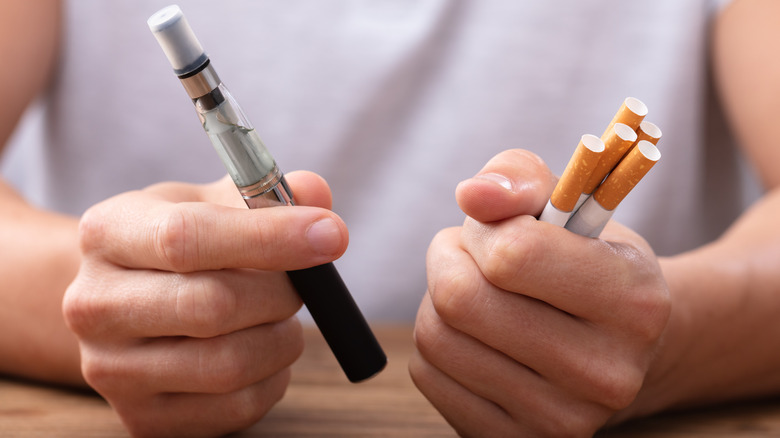The Surprising Link Between Vaping And Diabetes Risk
According to the Centers for Disease Control and Prevention (CDC), more than 37 million Americans have diabetes, and 20% of those people don't know they have it. Now, health experts suggest Americans may be inadvertently upping their risks for developing the potentially debilitating disease by using vape pens (also known as e-cigarettes). A 2022 study published in the American Journal of Preventive Medicine found a positive relationship between the use of e-cigarettes and the onset of prediabetes, a condition known to be a precursor to diabetes.
Prediabetes is characterized as blood sugar levels too low to be classified as type 2 diabetes but high enough to be considered a serious health concern (per the CDC). This blood sugar level strains the pancreas and can result in type 2 diabetes if a person doesn't change the lifestyle factors leading up to it.
The researchers looked at data collected from a survey of over half a million people that were either current vape users, former vape users, or those who have never vaped. They found that both current and former vape users had a significantly higher risk of developing prediabetic symptoms, particularly higher blood sugar levels, than those who never smoked. While many turn to e-cigarettes believing they're healthier than regular cigarettes, the data suggest they're not (via U.S. Food & Drug Administration).
How does vaping lead to higher diabetes levels?
A 2019 study published by Dr. Nora Volkow, Director of the National Institute on Drug Abuse (NIDA) at the National Institutes of Health, found a direct link between nicotine and the development of prediabetic symptoms and type 2 diabetes. Receptors in the brain can become activated by nicotine and keep the pancreas from manufacturing insulin, causing blood sugar levels to rise. While health risks connected to nicotine cigarettes may not be so surprising, some may be startled by the risks associated with vapes and e-cigarettes.
"There is a real concern that there's a perception among the younger population that e-cigarettes are a safer alternative [to smoking], but more and more evidence is piling up that e-cigarettes are not safe," senior researcher Shyam Biswal, a professor at Johns Hopkins University School of Public Health and co-author of the study told U.S. News & World Report. He further warns that the rise in prediabetes in young people is alarming but can be prevented through lifestyle modifications such as avoiding vapes and e-cigarette products.


